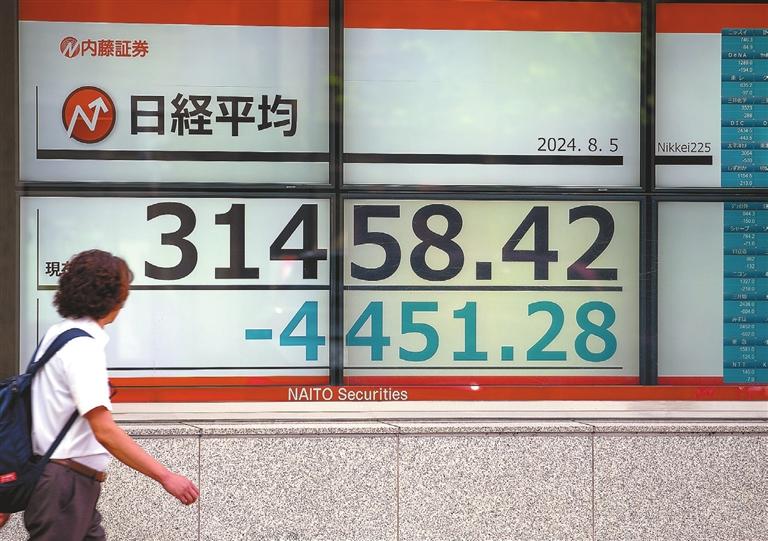
JAPAN’S benchmark Nikkei 225 stock index plunged 12.4% yesterday in the latest bout of sell-offs that are shaking world markets as investors fret over the state of the U.S. economy. The Nikkei closed down 4,451.28 points at 31,458.42. The market’s broader TOPIX index fell 12.8% as selling picked up in the afternoon. A report showing hiring by U.S. employers slowed last month by much more than expected has convulsed financial markets, vanquishing the euphoria that had taken the Nikkei to all-times highs of over 42,000 in recent weeks. Elsewhere in Asia, Hong Kong's Hang Seng index lost 1.55% to 16,683. The Shanghai Composite index edged higher but then gave way, losing 1.54% to 2,860.7. The Nikkei 225 dropped 5.8% Friday, making this its worst two-day decline ever. Its worst single-day rout was a plunge of 3,836 points, or 14.9%, on a day dubbed “Black Monday” in October 1987. At one point, the benchmark sank as much as 13.4% yesterday. Share prices have fallen in Tokyo since the Bank of Japan (BOJ) raised its benchmark interest rate Wednesday. The Nikkei is now down 3.8% from a year ago. One factor driving the BOJ to raise rates was prolonged weakness in the Japanese yen, which has pushed inflation to above the central bank's 2% inflation target. Early yesterday, the dollar was trading at 142.39 yen, down from 146.45 late Friday and sharply below its level of over 160 yen a few weeks ago. Shares surged to stratospheric heights earlier this year on frenzied buying of shares in companies expected to thrive thanks to advances in artificial intelligence. The latest setback has hit markets heavily weighted toward computer chipmakers like Samsung Electronics and other technology shares. South Korea’s Kospi plummeted nearly 9% yesterday as Samsung's shares sank 10.3%. Taiwan Semiconductor Manufacturing Co., the world’s biggest chip maker, dropped 5.26%. Stocks tumbled around the world Friday after weaker than expected employment data fanned worries the U.S. economy could be cracking under the weight of high interest rates meant to tame inflation. Early yesterday, the future for the S&P 500 was 1.5% lower and that for the Dow Jones Industrial Average was down 0.7%. The VIX, an index that measures how worried investors are about upcoming drops for the S&P 500, fell about 26% as of early Monday. Bitcoin which recently had surged to nearly US$70,000, was down 14% at US$54,155.00. Oil prices were little changed. U.S. benchmark crude oil gained 9 cents to US$73.61 per barrel while Brent crude was flat at US$76.81 per barrel. The S&P 500's 1.8% decline Friday was its first back-to-back loss of at least 1% since April. The Dow Jones Industrial Average dropped 1.5%, and the Nasdaq composite fell 2.4%. (SD-Agencies) | 
